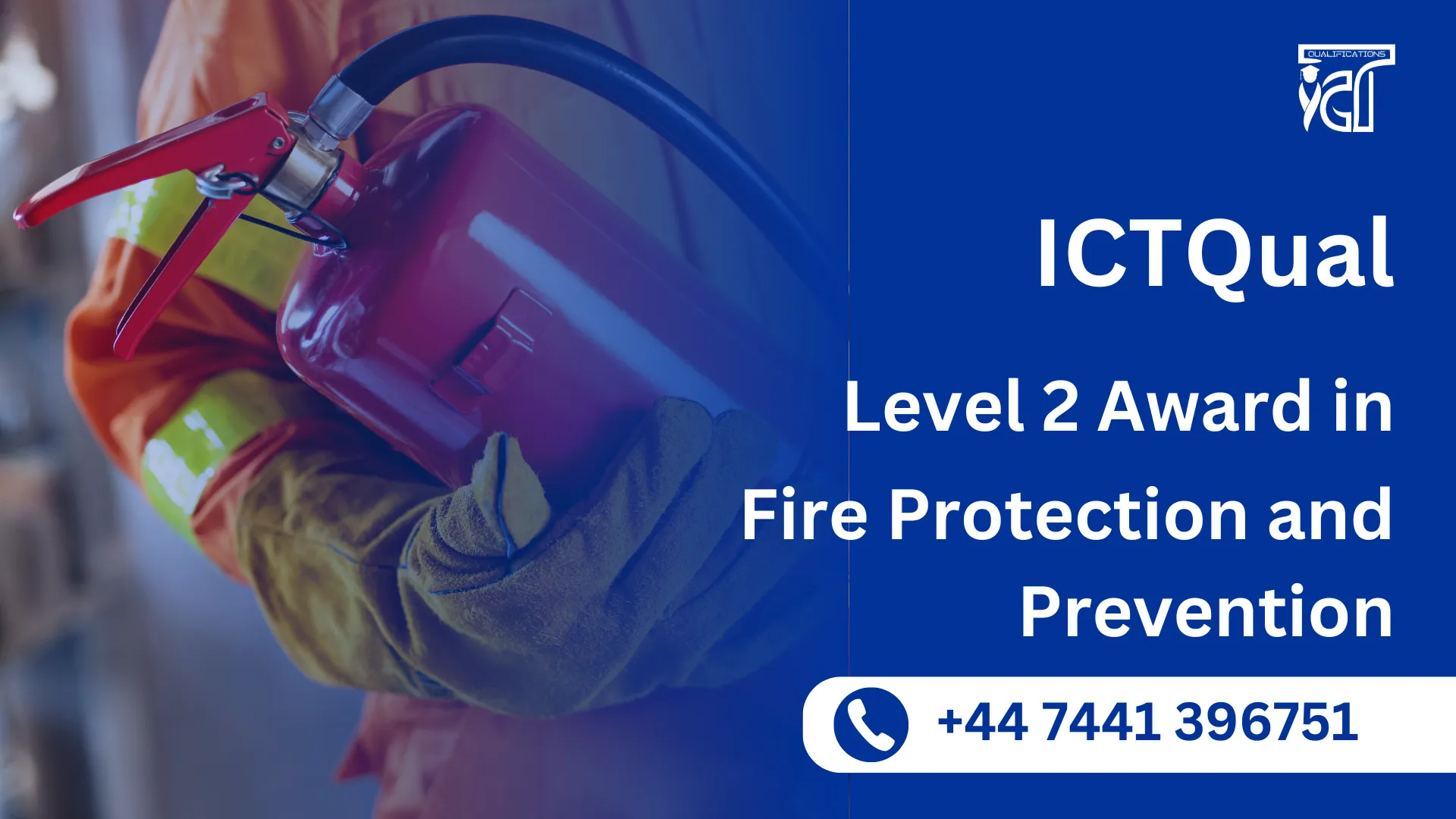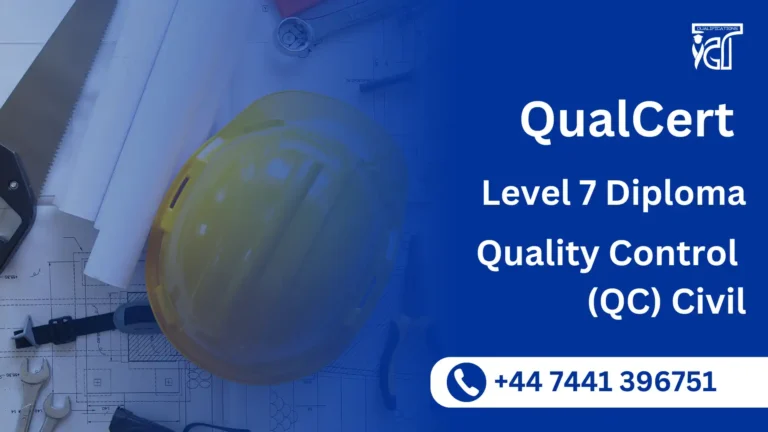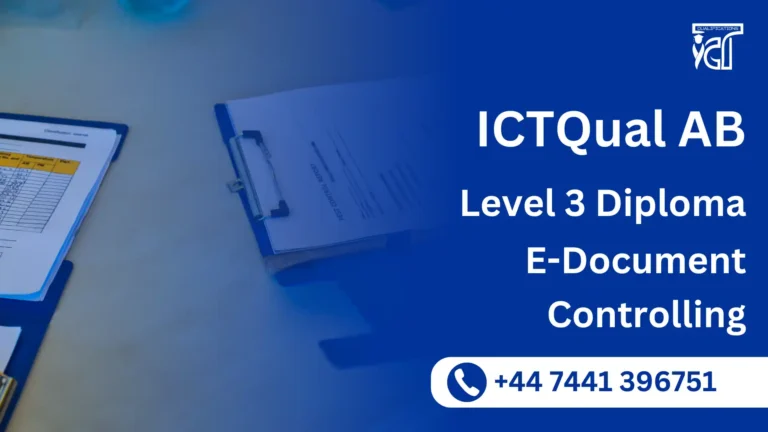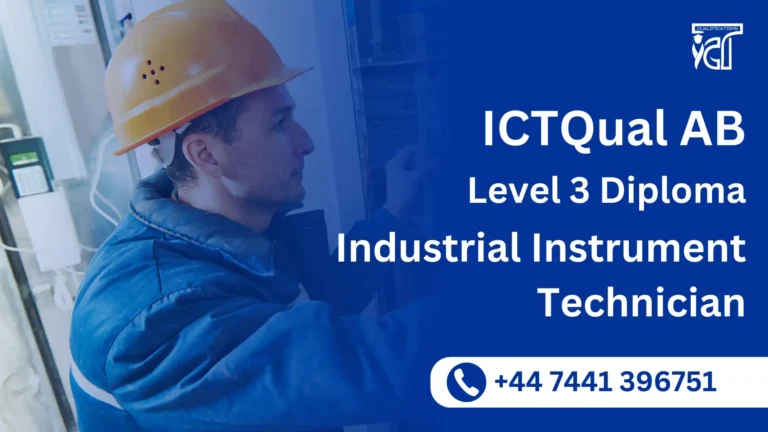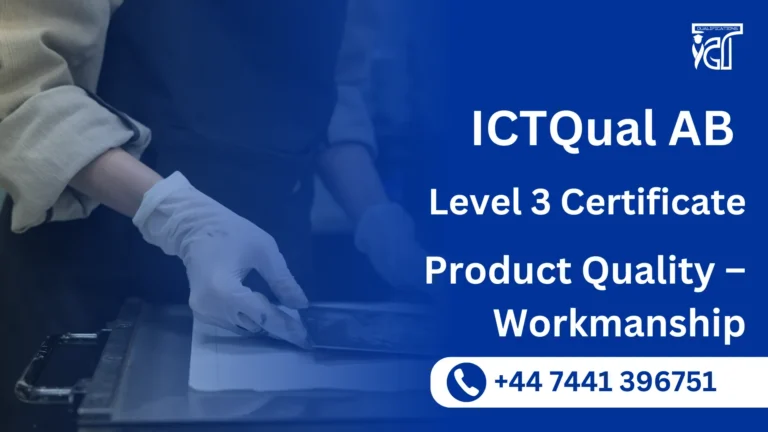Fire safety is a critical responsibility in today’s working environment, affecting everything from regulatory compliance to personal safety and property protection. The ICTQual Level 2 Award in Fire Protection and Prevention provides learners with the practical knowledge and technical understanding needed to manage fire risks effectively in a variety of settings.
This qualification is Ofqual-regulated, globally recognized, and 100% assignment-based, making it ideal for professionals seeking career progression or those responsible for fire safety in their workplace. Whether you’re in facilities management, construction, hospitality, or health and safety, this award equips you with essential fire prevention strategies and emergency planning skills.
The ICTQual Level 2 Award in Fire Protection and Prevention offers intermediate-level training for those looking to expand their fire safety expertise beyond the basics. It covers legal responsibilities, fire risk assessments, fire behavior, and the correct use of fire safety equipment.
This course builds on foundational knowledge and is designed to help individuals take a more active role in ensuring safety and compliance across their organization.
As an Ofqual-accredited qualification, this award is recognized internationally and demonstrates a high standard of competency in fire safety management.Ideal for working professionals, this course offers a flexible, exam-free learning model, with assessments based on real-world tasks and scenarios.
The ICTQual Level 2 Award in Fire Protection and Prevention is the perfect next step for individuals committed to workplace safety and professional growth. With its practical focus, global recognition, and flexible format, this qualification empowers you to lead fire prevention efforts and ensure regulatory compliance within your organization.
Enhance your fire safety knowledge and take control of risk—enroll in the ICTQual Level 2 Award today.
ICTQual Level 2 Award in Fire Protection and Prevention
This qualification, the ICTQual Level 2 Award in Fire Protection and Prevention, consists of 6 mandatory units.
- Identifying Fire Risks in the Workplace
- Fire Prevention Strategies and Control Measures
- Understanding Fire Safety Equipment and Their Uses
- Fire Emergency Response Planning
- Legal and Regulatory Requirements for Fire Safety
- Conducting Fire Safety Inspections
GLH (Guided Learning Hours) and TQT (Total Qualification Time) are terms commonly used in vocational qualifications to help define the amount of time a learner is expected to spend on their studies.
1. GLH (Guided Learning Hours)
GLH refers to the number of hours a learner spends being directly taught, supervised, or supported during their course. This includes the time spent in activities such as:
- Classroom instruction
- Practical workshops
- One-on-one tutoring or mentoring sessions
- Online learning sessions with tutor support
In other words, GLH represents the time that learners are actively engaged with their instructors or learning activities.
2. TQT (Total Qualification Time)
TQT represents the total amount of time a learner is expected to invest in completing a qualification, including:
- GLH (Guided Learning Hours): Time spent on direct learning, as explained above.
- Self-Directed Learning: This includes time spent on independent study, research, assignment completion, preparation for exams, and any other work the learner does outside of direct teaching hours.
TQT is a broader measure that includes all the time required to achieve the qualification. It helps learners and employers understand the overall commitment required for the qualification.
Key Differences Between GLH and TQT:
- GLH focuses on direct learning with guidance or supervision.
- TQT includes GLH as well as independent study time and other learning-related activities.
Example:
If a qualification has a TQT of 600 hours and a GLH of 250 hours, it means the learner should spend 250 hours in direct learning (classroom, online, or tutor-led sessions) and 350 hours on independent study or research.
Here are the learning outcomes for each study unit:
Identifying Fire Risks in the Workplace
- Identify different fire hazards in various work settings.
- Understand how fire risks can affect safety and business operations.
Fire Prevention Strategies and Control Measures
- Learn methods for reducing fire risks through workplace practices.
- Understand different fire control measures and their applications.
Understanding Fire Safety Equipment and Their Uses
- Gain knowledge of different types of fire extinguishers and their applications.
- Learn the importance of proper fire safety equipment maintenance.
Fire Emergency Response Planning
- Develop an understanding of fire emergency action plans.
- Learn how to coordinate evacuation procedures effectively.
Legal and Regulatory Requirements for Fire Safety
- Understand fire safety laws and compliance requirements.
- Learn how regulations influence workplace fire prevention strategies.
Conducting Fire Safety Inspections
- Develop basic skills for conducting fire safety inspections.
- Learn how to identify and report fire hazards.
Course Benefits: ICTQual Level 2 Award in Fire Protection and Prevention
The ICTQual Level 2 Award in Fire Protection and Prevention is a valuable qualification for professionals and organizations aiming to enhance workplace fire safety. Below are the key benefits of this globally recognized and Ofqual-regulated course:
1. Ofqual Regulated and Internationally Recognized
This qualification is regulated by Ofqual, the UK’s official body for qualifications, ensuring it meets high academic and professional standards. It is accepted by employers and institutions across various industries worldwide.
2. 100% Assignment-Based – No Exams
The course uses a practical, assignment-only assessment format, eliminating the pressure of final exams and allowing learners to demonstrate real-world understanding through applied knowledge.
3. Enhanced Fire Safety Skills
Learners gain a solid understanding of fire hazards, fire risk assessments, prevention strategies, and emergency procedures, making them more capable and confident in maintaining safe environments.
4. Career Development Opportunities
Successfully completing this award boosts your CV and can lead to roles such as Fire Warden, Health and Safety Assistant, or Fire Safety Coordinator, particularly in high-risk industries like construction, manufacturing, and hospitality.
5. Supports Legal and Workplace Compliance
With strong coverage of fire safety laws and responsibilities, this course helps individuals and organizations meet regulatory requirements and reduce the risk of fines, insurance claims, or workplace incidents.
6. Practical Knowledge for Immediate Application
All course content is workplace-relevant. Learners can apply their knowledge immediately to improve safety procedures, conduct fire drills, and manage fire protection systems.
7. Flexible Learning Format
This course is often delivered through online or blended learning, making it ideal for full-time professionals who want to study at their own pace and location.
8. Improves Safety Culture Within Organizations
Trained staff are better equipped to promote a proactive fire safety culture, reduce incidents, and ensure everyone knows how to respond in emergencies.
9. Cost-Effective Professional Training
This course provides high-impact training without the high cost, offering organizations and individuals a cost-effective way to boost fire safety competence.
10. Clear Progression Pathway
Graduates can continue their professional development by progressing to higher-level qualifications such as the ICTQual Level 3 Certificate in Fire Protection and Prevention or other specialized safety training programs.
The ICTQual Level 2 Award in Fire Protection and Prevention is more than a qualification—it’s an investment in personal growth, organizational safety, and legal compliance. Whether you’re enhancing your career or improving workplace safety, this course delivers measurable value.
Who Is the Best Fit for the ICTQual Level 2 Award in Fire Protection and Prevention?
The ICTQual Level 2 Award in Fire Protection and Prevention is tailored for individuals who are ready to take on greater responsibility in fire safety and contribute to creating safer working environments. This qualification is ideal for those seeking to enhance their practical understanding of fire risks, prevention strategies, and emergency response procedures.
1. Fire Wardens and Fire Marshals
This course is highly suitable for designated fire wardens or fire marshals who need formal training to effectively manage fire safety duties and support emergency planning within their workplace.
2. Health and Safety Personnel
Health and safety officers or assistants looking to strengthen their fire prevention knowledge and improve compliance with fire safety legislation will benefit greatly from this qualification.
3. Facilities and Building Supervisors
Individuals responsible for managing or maintaining buildings, including supervisors in offices, factories, or public spaces, will find this course essential for ensuring fire safety systems and protocols are up to date and compliant.
4. Construction and Industrial Workers
Professionals working in high-risk sectors such as construction, manufacturing, or warehousing can use this course to improve their awareness of fire hazards and ensure safe practices on-site.
5. Supervisors and Team Leaders
Line managers, team leaders, or shift supervisors who oversee daily operations and staff safety will gain valuable skills in fire risk identification, prevention techniques, and emergency coordination.
6. Public Sector and Education Staff
This course is also ideal for individuals working in schools, healthcare facilities, government offices, and other public service settings, where fire safety responsibilities are shared among staff.
7. Professionals Seeking Career Progression
Anyone planning to advance into roles such as Fire Safety Coordinator, Compliance Officer, or Health and Safety Manager can use this qualification as a stepping stone toward more advanced certifications.
Whether you’re already involved in workplace safety or are stepping into a role that involves fire risk management, the ICTQual Level 2 Award in Fire Protection and Prevention equips you with the essential knowledge and practical skills to protect lives, assets, and operations. It is the ideal fit for those seeking a recognized, assignment-based qualification that leads to career growth and a safer work environment.
Entry Requirements
Register Now
Qualification Process
Qualification Process for the ICTQual Level 2 Award in Fire Protection and Prevention
- Self-Assessment:
Begin by evaluating your eligibility to ensure you meet the qualification requirements, including work experience, knowledge, and language proficiency. - Registration:
Complete your registration by submitting the required documents, including a scanned copy of a valid ID, and paying the registration fee. - Induction:
An assessor will conduct an induction to confirm your eligibility for the course and explain the evidence requirements. If you do not meet the criteria, your registration will be canceled, and the fee will be refunded. - Assignmnets & Evidence Submission:
Provide all assignmnets and the necessary evidence based on the assessment criteria outlined in the course. If you are unsure of the required evidence, consult with the assessor for guidance on the type and nature of evidence needed. - Feedback and Revision:
The assessor will review your submitted evidence and provide feedback. Evidence that meets the criteria will be marked as “Criteria Met,” while any gaps will be identified. You will be asked to revise and resubmit if needed. - Competence Evidence:
Submit final evidence demonstrating that all learning outcomes have been met. This evidence will be marked as “Criteria Met” by the assessor once it is satisfactory. - Internal Quality Assurance (IQA):
The Internal Quality Assurance Verifier (IQA) will review your evidence to ensure consistency, quality, and compliance with standards. - External Verification:
The IQA will submit your portfolio to ICTQUAL AB External Quality Assurance Verifiers (EQA) for final confirmation. The EQA may contact you directly to verify the authenticity of your evidence. - Certification:
Upon successful completion of all checks, ICTQUAL AB will issue your official certificate, confirming that you have attained the ICTQual Level 2 Award in Fire Protection and Prevention.

